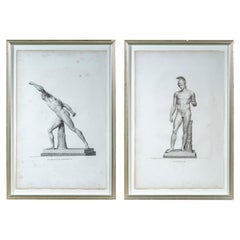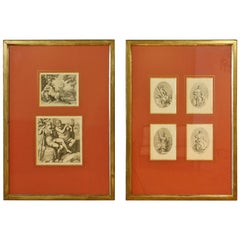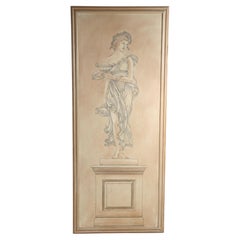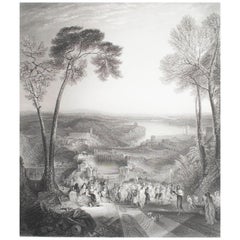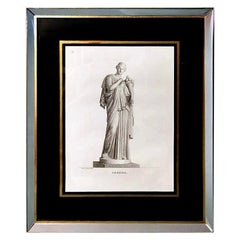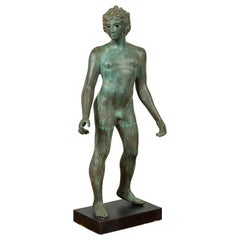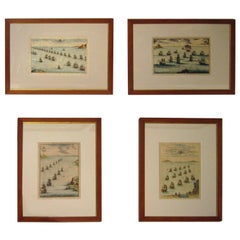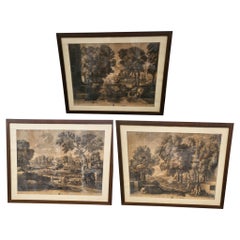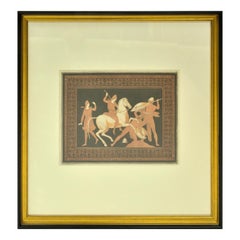Classical Greek Prints
There is rare surviving furniture from ancient Greece, yet this classical style has informed design for centuries. Interiors of houses in antiquity were minimal, with much of a room’s color coming from frescoes on the walls and mosaics on the floors. Classical Greek furniture was sparing but finely crafted and influenced by Egyptian furniture design through Mediterranean trade.
Furnishings of the period were usually made from local wood like cypress, cedar, oak and willow from ancient Greece’s plentiful forests, although some pieces were carved from marble, such as a 300–200 B.C. throne with lion legs and a curved back now at the Getty Villa. Comfort and clean lines characterized designs during the Classical era, the symmetry and thoughtful proportions reflecting the architecture of Greek temples.
Some pieces of ancient Greek furniture were simple, rectangular platforms like the klinē, a multipurpose ancestor of today’s couches or daybeds that held cushions stuffed with wool, dry grass or down. These structures were used for both sleeping and dining, which wealthy Greeks did while reclining. At night, oil lamps illuminated rooms that frequently surrounded a garden courtyard.
Most of what scholars have learned about Greek furniture design owes to its representations in art like vases and stelae. The portable diphros stool, with its backless design and four turned legs, was one of the more common types of seating in daily Greek life — it appears as such for the gods on the Parthenon frieze. Stools without backs have been found in early Roman tombs, while benches were also common Greek seating furniture created for use in theaters. In houses of the Hellenistic period, benches seemingly functioned as tables, too.
Some designs evolved through adaptations by the Romans, including the klismos chair. After prominent archaeological excavations at Pompeii and Herculaneum, the klismos chair — with its four saber legs and the elegant curves that define its back — was a source of inspiration for aesthetics in eras ranging from 18th-century neoclassicism to 20th-century Art Deco.
Find a collection of Classical Greek decorative objects, wall decorations and building and garden elements on 1stDibs.
Early 19th Century French Antique Classical Greek Prints
Paper
18th Century French Antique Classical Greek Prints
Giltwood, Paper
Mid-20th Century American Classical Greek Prints
Wood, Paper
1850s English Antique Classical Greek Prints
Paper
1850s English Antique Classical Greek Prints
Paper
Late 19th Century French Antique Classical Greek Prints
Wood, Paper
1850s English Antique Classical Greek Prints
Paper
Late 18th Century European Antique Classical Greek Prints
Paper, Glass
20th Century Classical Greek Prints
Bronze
18th Century Unknown Antique Classical Greek Prints
Glass, Wood, Paper
1950s Mexican Vintage Classical Greek Prints
Mahogany
1880s French Antique Classical Greek Prints
Wood, Paint
Late 18th Century English Antique Classical Greek Prints
Paper
21st Century and Contemporary Italian Classical Greek Prints
Mirror, Wood, Paper
Late 18th Century English Antique Classical Greek Prints
Paper
Late 19th Century English Antique Classical Greek Prints
Wood, Oak
Late 18th Century French Antique Classical Greek Prints
Paper
Mid-19th Century French Antique Classical Greek Prints
Paper
Early 1800s Antique Classical Greek Prints
Paper
1840s Antique Classical Greek Prints
Paper
Late 18th Century French Antique Classical Greek Prints
Paper
Late 18th Century European Antique Classical Greek Prints
Glass, Paper
Late 18th Century European Antique Classical Greek Prints
Glass, Paper
Late 17th Century European Antique Classical Greek Prints
Glass, Paper
1810s English Antique Classical Greek Prints
Paper
Mid-20th Century English Classical Greek Prints
Paper, Paint
18th Century Antique Classical Greek Prints
Wood
Late 18th Century Greek Antique Classical Greek Prints
Paper
